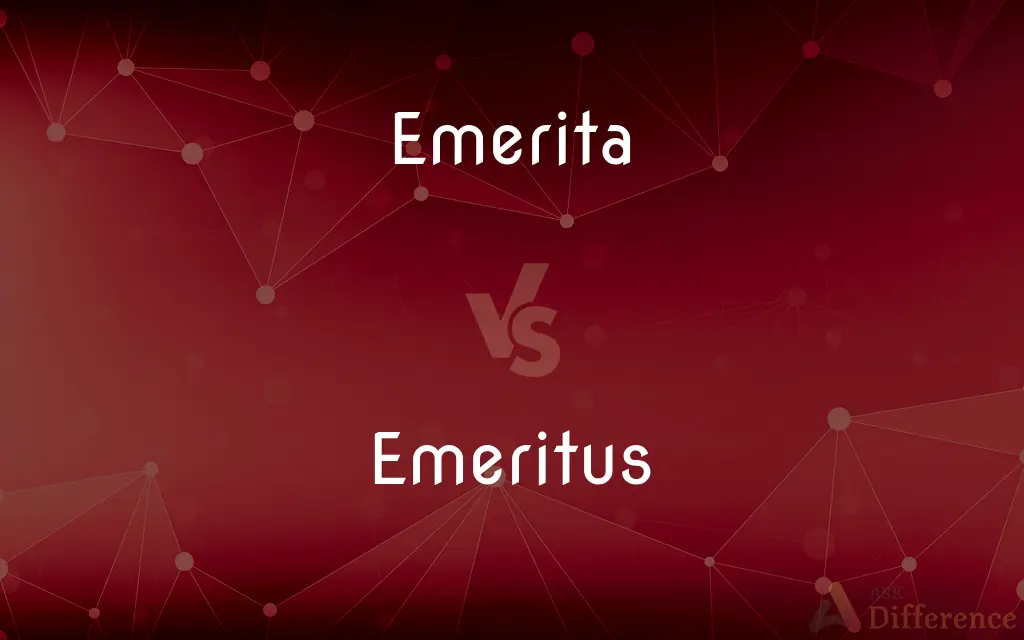Emerita vs. Emeritus — What's the Difference?
By Maham Liaqat & Urooj Arif — Updated on March 19, 2024
Emerita is the feminine form used for a retired woman from a professional position, while emeritus is the masculine form for a retired man.

Difference Between Emerita and Emeritus
Table of Contents
ADVERTISEMENT
Key Differences
Emerita is a term applied to a woman who has retired from a position of professional distinction, typically in academic, religious, or other notable fields. It denotes not only retirement but also honor and continued association with the place of employment. Emeritus, on the other hand, serves the same purpose for men, acknowledging their contributions and allowing them to retain their title in retirement.
The use of emerita and emeritus highlights respect for the individual's lifelong contributions and achievements. For instance, a professor who retires after a long and distinguished career may be granted the title of Professor Emerita or Emeritus, depending on their gender, as a mark of honor.
Institutions adopt these titles to maintain a relationship with retired professionals, recognizing their ongoing contributions to the field, such as mentorship, research, or participation in academic events. While emerita is used for women, emeritus can be applied to men or used as a gender-neutral term in some contexts, reflecting inclusivity and respect for all genders.
The selection of emerita or emeritus status is typically based on significant accomplishments and service. It's a title that carries prestige and acknowledges the retiree's role in shaping their profession or discipline.
Both titles allow retired professionals to remain engaged in their fields, contributing their knowledge and expertise beyond retirement. The distinction between emerita and emeritus underscores the importance of recognizing individual achievements in a gender-appropriate manner, promoting equality and respect within professional communities.
ADVERTISEMENT
Comparison Chart
Definition
A woman retired from a professional position of honor
A man retired from a professional position of honor
Usage
Specifically for women
Primarily for men, but can be gender-neutral
Associated Fields
Academic, religious, and others
Academic, religious, and others
Significance
Honor and continued association
Honor and continued association
Gender Neutrality
No, gender-specific
Yes, can be used as a gender-neutral term
Compare with Definitions
Emerita
Often used for retired female professors or university officials.
She was named Dean Emerita after her retirement.
Emeritus
Allows ongoing engagement in academic or professional activities.
The Emeritus professor continues to publish research papers.
Emerita
Maintains a connection with the institution post-retirement.
As a Professor Emerita, she still mentors students.
Emeritus
A title for a man who has retired but retains his rank or title.
Professor John Smith, Emeritus, was honored at the ceremony.
Emerita
Denotes honor and respect for the individual’s contributions.
Being named Emerita reflects her impact on the department.
Emeritus
Indicates continued esteem and recognition by the institution.
His Emeritus title signifies ongoing involvement with the university.
Emerita
Acknowledges a lifetime of service and achievement.
Her Emerita status honors her decades of teaching excellence.
Emeritus
Commonly used for retired male professors or university officials.
He has been appointed Professor Emeritus in recognition of his service.
Emerita
A title for a woman who has retired but retains her rank or title.
Professor Jane Doe, Emerita, continues to contribute to research.
Emeritus
A testament to the individual’s enduring legacy and contributions.
His Emeritus status celebrates a distinguished career.
Emerita
Retired but retaining an honorary title corresponding to that held immediately before retirement. Used of a woman
A professor emerita.
Emeritus
Emeritus (; female: Emerita), in its current usage, is an adjective used to designate a retired chair, professor, pastor, bishop, pope, director, president, prime minister, rabbi, emperor, or other person who has been "permitted to retain as an honorary title the rank of the last office held".In some cases, the term is conferred automatically upon all persons who retire at a given rank, but in others, it remains a mark of distinguished service, awarded only to a few on retirement. It is also used when a person of distinction in a profession retires or hands over the position, enabling their former rank to be retained in their title, e.g., "professor emeritus".
Emerita
A woman who is retired but retains an honorary title corresponding to that held immediately before retirement.
Emeritus
Retired but retaining an honorary title corresponding to that held immediately before retirement
A professor emeritus.
Emerita
Feminine singular of emeritus
Emeritus
One who is retired but retains an honorary title corresponding to that held immediately before retirement.
Emerita
The female equivalent of emeritus.
Emeritus
(postpositive) Retired, but retaining an honorific version of a previous title.
Professor emeritus
Pontiff emeritus
Emerita
Plural of emeritum
Emeritus
A person retired in this sense.
Emeritus
Honorably discharged from the performance of public duty on account of age, infirmity, or long and faithful services; - said of an officer of a college or pastor of a church.
Emeritus
A veteran who has honorably completed his service.
Emeritus
Honorably retired from assigned duties and retaining your title along with the additional title `emeritus' as in `professor emeritus'; `retired from assigned duties' need not imply that one is inactive
Common Curiosities
Do emerita and emeritus professionals still work?
They may not hold their former positions but often continue to contribute to their fields through research, mentorship, or advisory roles.
Can both men and women be referred to as emeritus?
Yes, in contemporary contexts, emeritus can refer to both men and women, though emerita is exclusively for women.
How are emerita and emeritus titles awarded?
Institutions typically award these titles based on internal criteria, recognizing professional achievements and contributions.
Can someone decline emerita or emeritus status?
Yes, although it is an honor, an individual can decline the title for personal or professional reasons.
Do emerita and emeritus titles come with benefits?
Benefits can include continued access to institutional resources, involvement in academic activities, and maintaining a formal connection with the institution.
What qualifies someone for emerita or emeritus status?
Qualification often includes distinguished service, significant contributions to the field, and retirement from a position of professional distinction.
Is emeritus always used for men?
While traditionally used for men, emeritus can also be a gender-neutral term in modern usage.
Is there a difference in the roles of emerita and emeritus professionals?
No, the roles and opportunities for engagement post-retirement are similar; the distinction lies in the gender specificity of the titles.
Are these titles used outside academia?
Yes, while most common in academia, these titles can also be used in other fields, such as religious organizations or corporate sectors.
What is the importance of emerita and emeritus titles?
These titles honor and recognize the retiree’s contributions, allowing continued affiliation and engagement with the professional community.
Share Your Discovery

Previous Comparison
Cask vs. Casket
Next Comparison
Underliner vs. SaucerAuthor Spotlight
Written by
Maham LiaqatCo-written by
Urooj ArifUrooj is a skilled content writer at Ask Difference, known for her exceptional ability to simplify complex topics into engaging and informative content. With a passion for research and a flair for clear, concise writing, she consistently delivers articles that resonate with our diverse audience.














































